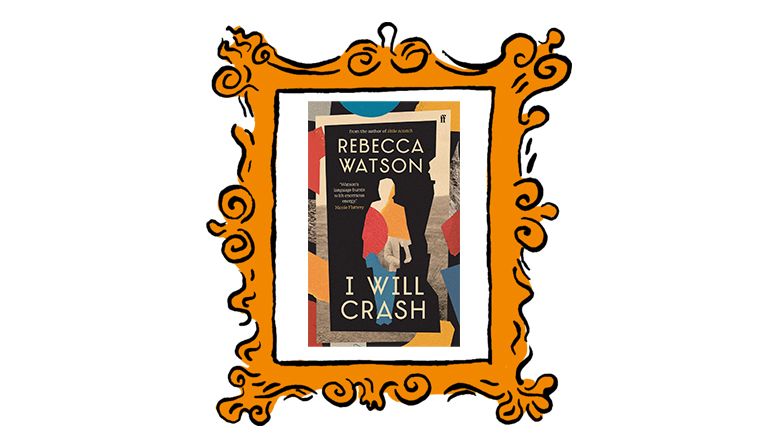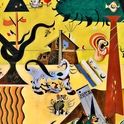Open Rebecca Watson’s latest novel, I Will Crash, and the first thing you’ll notice is her penchant for scattering words across the page. Where most authors punctuate using punctuation, Watson likes nothing better than dispensing with commas and full stops altogether, punctuating instead with empty white space. Isolated thoughts articulated by her characters clarify their meaning in the context of other isolated thoughts. When characters take time to formulate an idea, the typography on the page breathes, hesitates, bunches together, in sympathy with them. Watson’s way of notating passing time locks the reader inside the continuous present, with surrounding layers of memory generating a web of interwoven narratives.
As a way of drawing the reader inside the inner world of her characters, this is a genius strategy on Watson’s part. Her first novel, little scratch, pursued—let’s call it—her time-space notation to even more ornate lengths. Single lines of text containing two or three different spontaneously unfolding conversations, or trains of thought, challenged readers to trace those thoughts, often by re-reading, taking multiple routes around a particular line; the point of this verbal counterpoint being that real conversations overlap and take unexpected digressions. Watson’s new novel strips some of that graphic density back, which unlocks deep and unsettling emotional complexities.
I Will Crash concerns itself with the death of a brother. It starts with Watson’s principal protagonist, Rosa, opening her front door to that brother, but declining to invite him in. The next thing we know, Rosa’s brother is dead—an event that spins her into emotional mayhem. We learn that, while they were growing up, Rosa’s brother was compulsively cruel to his sister, abusing her emotionally and physically. Losing a brother is a reason to mourn, but Rosa’s grief is necessarily qualified, coated in a certain amount of relief, even. Watson’s dislocating, disembodied text mirrors the abrupt disintegration of Rosa’s reality, her head now spinning. Fragments of text flake off the page, like the punctured skin from all those pokes, scratches and slaps that Rosa’s brother subjected her to.
Claiming a novel as “experimental” would likely torpedo any ambitions anyone involved might have to sell copies, and Faber didn’t invoke the term when Watson’s book was published earlier this month. But there’s no doubt that I Will Crash might easily be confused for an “experimental novel”.
I once witnessed the composer Harrison Birtwistle take very great exception at being categorised as an “experimental composer”. “I know what I’m doing,” Birtwistle snapped back, “so why would I need to ‘experiment’?” And Watson plays this contradiction between “knowing” technique and her own knowing that freeloading off technique can trap art inside a creative straitjacket with considerable cunning. little scratch took place over a single day; I Will Crash over a week. Authors of experimental literature, from James Joyce to Virginia Woolf, often imposed clear time frames to anchor their swerves across the page. That reference point is clear, can be taken as read here. Other lodestars of literary experiment come to mind, too: John Dos Passos’s nests of overlapping dialogue in his great 1920s New York novel Manhattan Transfer; William Gaddis’s generative loops of criss-crossing dialogue in his 1975 novel JR.
In one of I Will Crash’s most brilliant and daring passages, Watson places her novel explicitly into a lineage of experimental literature, then negates the point entirely with a dazzling sleight-of-hand. Rosa’s boyfriend, John, turns out to be a Gertrude Stein aficionado and the pair discuss Stein’s famous line, from her 1913 poem “Sacred Emily”—“Rose is a rose is a rose is a rose”—as Rosa, adjusting to her shocking new reality, is feeling conflicted about her own identity. Two characters in an experimental novel playing such referential games might sound like pure cringe. But Watson’s set up is immaculate. “A death is a death is a death,” questions Rosa—question mark removed—as John reminds her that Stein’s line has become an ultimate cliché and “Stein-nuts roll their eyes at quoting it.”
“It’s a language game,” they conclude, as of course all novels ultimately are. The problem with the experimental novel is that the experiment has a tendency to solidify into a carefully organised way of working; then it becomes “The Experimental Novel”, a genre in itself that comes loaded with expectations. Experimental art, in its purest form, is rarely about doing the thing itself, rerunning certainties of technique that are guaranteed to trigger a predictable emotional response. The experiment asks questions of the thing—what is it; why would I want to involve myself in this activity; how can I make the thing behave differently while requiring it to reveal other facets of itself?
Watson’s work is that of an instinctive experimenter who, intuition tells me, never set out with any intention of becoming an experimental novelist. little scratch and I Will Crash are both fuelled by improvisational flow and energy. This is an author open to being surprised by her material, who is prepared to let the demands of her material determine form, pacing and shape; to let her words write her as much as she writes them. Shoehorning her material into pre-existing narrative formats would surely be an anathema to her. As Watson’s close communion with her text leads her to unwrite punctuation, and to drop readers inside the thought patterns behind her dialogue, you grasp why this book could never have been notated in any other way. You’re prepared to go along with the experiment, then admire the wonderful writing.
Rebecca Watson and the art of experimentation
The very notion of ‘experimental art’ can be off-putting. But the author of ‘I Will Crash’ shows how it can be exhilarating too
July 18, 2024












